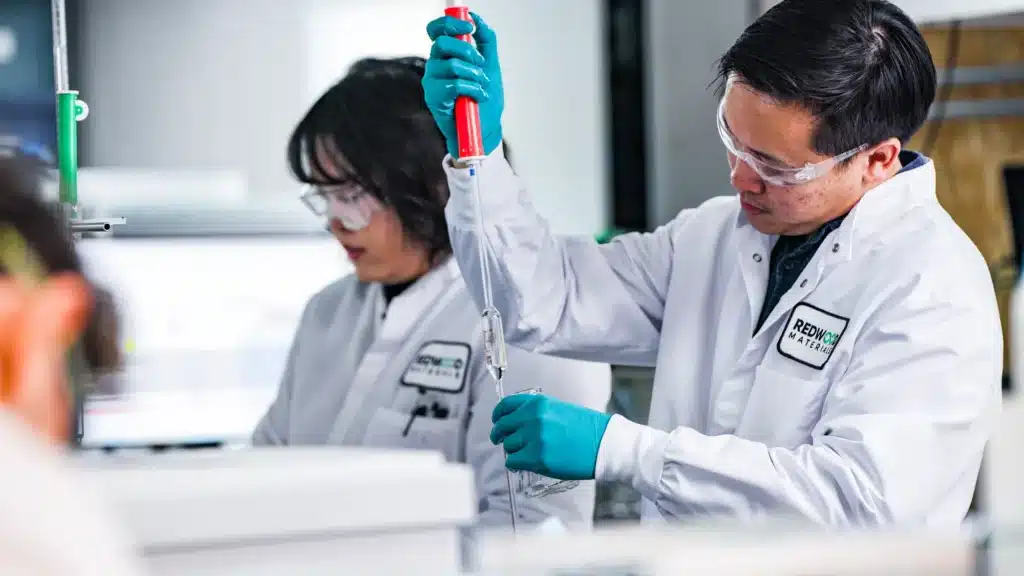Redwood Materials Opens New San Francisco R&D Center
Redwood Materials recently announced the opening of its new research and development center in the heart of San Francisco, California. This 15,000-square-foot facility, located in the city’s Design District, marks Redwood’s first footprint in the Bay Area and a major milestone in the company’s continued expansion.
Redwood Materials has been on a fast-moving trajectory. Over the past year alone, the company has recycled more than 20 GWh of lithium-ion batteries—the equivalent of approximately 250,000 electric vehicles. Redwood also opened the first new domestic sources of lithium and nickel in over a decade and began construction on what will be the United States’ first commercial cathode production facility.
With Battery Materials Campuses underway in both Nevada and South Carolina and production scaling rapidly, Redwood is now turning its focus toward deepening technical innovation to support its next phase of growth.

The new R&D center is designed to fuel innovation across the battery materials ecosystem, including cathode production and future product lines. Equipped with state-of-the-art lab spaces, the facility will support the engineering work that powers Redwood’s mission: to recycle the majority of lithium-ion batteries in the U.S., recover over 95% of critical minerals, extend battery life when possible, and manufacture battery components domestically at scale for the first time.
With San Francisco’s reputation as a global hub for engineering and technical talent, the city provides an ideal setting for this new phase of Redwood’s journey. The company is actively hiring for dozens of roles in the Bay Area, primarily in mechanical, electrical, and software engineering. Hiring also continues across all departments at Redwood’s campuses in Nevada and South Carolina.
Redwood is building a closed-loop, circular battery supply chain to power a more sustainable world and accelerate the transition away from fossil fuels. By localizing a global supply chain and producing battery materials in the U.S. using as many recycled batteries as possible, Redwood is making batteries both more sustainable and more affordable.
The company’s two Battery Materials Campuses—the Tahoe Campus in Northern Nevada and the Carolina Campus outside Charleston, South Carolina—are central to this mission. Each integrates battery recycling, refining, and materials production to support the goal of producing 100 GWh of sustainable battery materials annually—enough to make more than one million electric vehicle batteries.
As Redwood deepens its roots in San Francisco, the company remains committed to building a cleaner, more resilient energy future—one battery at a time.
Why EV Battery Manufacturing and Recycling Matter for America’s Future
As electric vehicles (EVs) shift from novelty to necessity, one thing is clear: the batteries that power them are becoming the backbone of America’s clean energy future. But it’s not just about going green — it’s also about national security, economic growth, and technological leadership. That’s why domestic EV battery manufacturing and recycling are critical for the United States right now. We commend Redwood as being a leader in this regard.
Reducing Dependence on Foreign Supply Chains
The majority of EV batteries today are made overseas, particularly in China. That creates a strategic risk. From raw materials to finished battery packs, relying too heavily on foreign suppliers leaves the U.S. vulnerable to global disruptions, political tensions, and supply chain bottlenecks.
Domestic manufacturing gives America greater control over the EV supply chain, ensuring we’re not left behind as demand skyrockets. It also means more reliable access to critical materials and components, especially during global crises.
Creating High-Quality American Jobs
Building batteries isn’t just about robots and tech — it’s about people. Domestic battery manufacturing can create thousands of high-paying jobs in engineering, manufacturing, logistics, and more. These aren’t jobs of the past — they’re the future of American industry.
Recycling facilities also bring new employment opportunities, often in regions hit hardest by industrial decline. That means real revitalization for local economies and skilled jobs for American workers.
Strengthening National Security
Batteries are about more than cars. They’re critical for grid storage, military applications, and next-gen tech. Securing a robust domestic battery supply strengthens national security by making sure the U.S. has what it needs to power essential systems — without relying on global competitors.
Making EVs More Affordable and Accessible
Manufacturing and recycling batteries at home reduces costs in the long run. Fewer shipping expenses, more supply stability, and technological innovation all drive prices down — making EVs more affordable for everyday Americans.
Recycling also helps solve one of the biggest challenges of EVs: what to do with batteries at the end of their life. By recovering valuable materials like lithium, cobalt, and nickel, we reduce the need for costly new mining and keep battery production sustainable.
Leading the Clean Energy Revolution
America has always been a leader in innovation — and the global race for clean energy dominance is underway. Investing in EV battery manufacturing and recycling puts the U.S. at the forefront of this transition, showcasing American leadership in sustainability, science, and smart policy. We have the talent, the technology, and the need. Now it’s about building the infrastructure to match.

Electric Vehicle Marketing Consultant, Writer and Editor. Publisher EVinfo.net.
Services